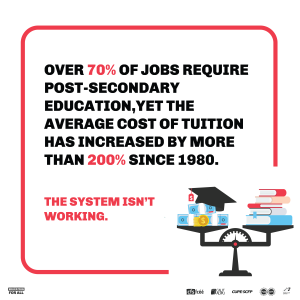This is an archive of news stories and research from the National Union of Public and General Employees. Please see our new site - https://nupge.ca - for the most current information.
“A high-quality and accessible post-secondary education system will be crucial to meeting the challenges of today and to a more equitable, more sustainable future. We need our colleges and universities, more than ever, to train workers who design, build, and maintain green infrastructure, who perform care work, including child care and long-term care, and the numerous other skills that contribute to our society.” — Larry Brown, NUPGE President

Ottawa (16 Feb. 2021) — Federal and provincial governments need to step up to fix serious issues in post-secondary education (PSE), says a new coalition representing over one million students and workers. In a report released today, the coalition outlines significant challenges facing the sector and lays out a comprehensive plan to strengthen post-secondary education as key to the pandemic response and recovery.
“The costs of education are rising, while growing inequality and stagnant wages mean that fewer Canadians will be able to access education and training, just when unemployment and economic displacement are high due to the pandemic,” the report notes.
Nikki Brayiannis, Deputy Chairperson of the Canadian Federation of Students (CFS), said, “Students from coast, to coast, to coast are fighting in solidarity for a high-quality, affordable post-secondary education that doesn’t leave anyone behind. Education for All is an opportunity to bridge gaps in our society like never before, with students, workers, and teachers at the centre of building a more equitable future.”
Why Education for All?
The report also details how PSE is a critical contributor to the social and economic health of Canada and the foundation for Canada’s knowledge advantage, yet it is under considerable strain without intervention.
- Public funding now represents less than half of total university revenue in Canada, leaving institutions to somehow make up the difference, often through over-reliance on exploitive international student fees
- Costs are out-stripping students’ ability to pay: average domestic undergraduate tuition has increased by 215 per cent since 1980, with average domestic graduate tuition increasing by 247 per cent since 1980, after accounting for inflation
- Since 2006, more than half of faculty hiring has become contract-based, driving precarity up and wages down
- Only 21 per cent of eligible First Nations students are receiving funding for postsecondary education
“A high-quality and accessible post-secondary education system will be crucial to meeting the challenges of today and to a more equitable, more sustainable future. We need our colleges and universities, more than ever, to train workers who design, build, and maintain green infrastructure, who perform care work, including child care and long-term care, and the numerous other skills that contribute to our society," said Larry Brown, President of the National Union of Public and General Employees (NUPGE). NUPGE is a member of the education coalition.
Recommendations for government
The coalition’s Education for All campaign asks the federal government to work with provinces and territories to fix issues of cost, precarity, equity and access — common across Canadian campuses.
Education for All calls for:
- Boosting federal funding for PSE through the transfer to the provinces by a minimum of $3 billion, ensuring that funding is transparent and accountable and keeps up with inflation and enrolment growth
- The elimination of interest rates on student loan repayments, the expansion of grants while working towards the gradual elimination of tuition fees
- Expanding Canada’s research capacity, which has been slowed as a result of the pandemic, through increased research funding and graduate scholarships
- Supporting a workforce renewal strategy that limits the sector’s use of precarious job contracts, contracting out and privatization
The Education for All campaign is a joint initiative of the Canadian Association of University Teachers (CAUT), the Canadian Federation of Students (CFS), the Canadian Union of Public Employees, the National Union of Public and General Employees (NUPGE) and the Public Service Alliance of Canada (PSAC), representing more than one million students and workers.
